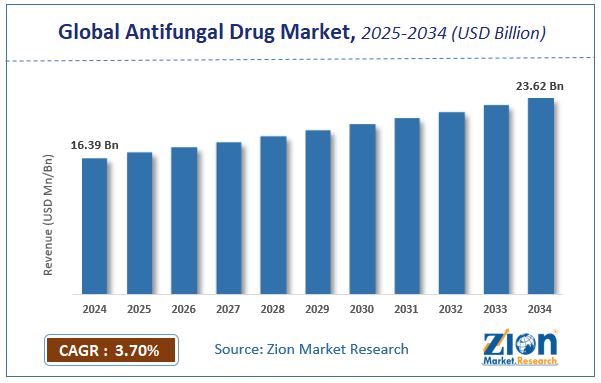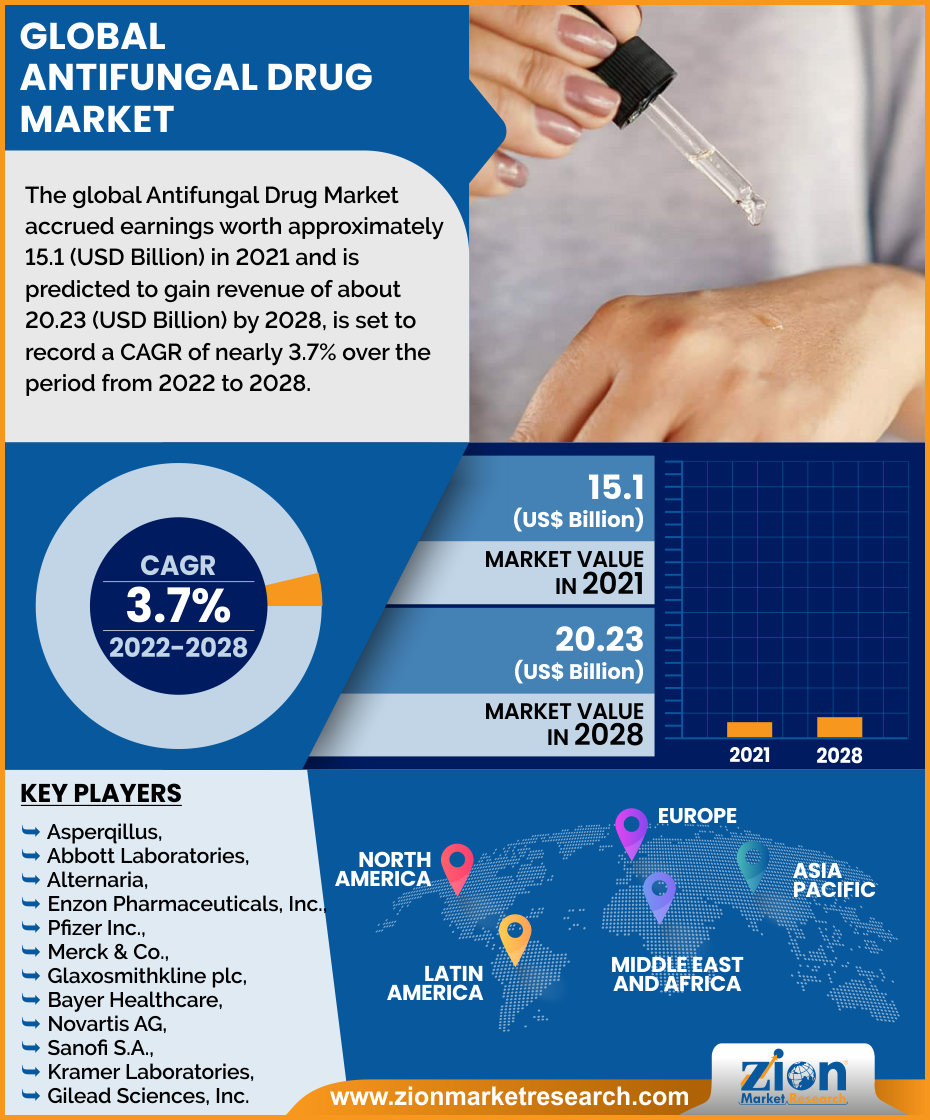Antifungal Drug Market Size, Share, Growth, Report 2028

Antifungal Drug Market - By Drug Type (Echinocandins, Azoles, Polyenes, and Allylamines), By Indication (Aspergillosis, Dermatophytosis, and Candidiasis), By Dosage Form (Powder, Ointments, and Tablets), By Distribution Channel (Hospital Pharmacies and Retail Pharmacies & Drug Stores), and By Region: Global Industry Perspective, Comprehensive Analysis, And Forecast, 2022 - 2028
| Market Size in 2021 | Market Forecast in 2028 | CAGR (in %) | Base Year |
|---|---|---|---|
| USD 15.1 Billion | USD 20.23 Billion | 3.7% | 2021 |
Antifungal Drug Market: Industry Perspective
The global antifungal drug market size was worth around USD 15.1 billion in 2021 and is predicted to grow to around USD 20.23 billion by 2028 with a compound annual growth rate (CAGR) of roughly 3.7% between 2022 and 2028.
The report analyzes the global antifungal drug market's drivers, restraints/challenges, and the effect they have on the demands during the projection period. In addition, the report explores emerging opportunities in the antifungal drug industry.
Antifungal Drug Market: Overview
Invasive fungal infections are a key cause of mortality in immune-compromised patients and this has proved to be an economic burden on the healthcare sector across the globe. As per NCBI, these infections have caused nearly 2 million fatalities each year. Moreover, recent antifungal drugs have proved to be less clinically efficient and new antifungal agents along with new combination regimens as well as new drug formulations for improving patient care will drive market trends. Furthermore, antifungal drugs eradicate pathogens from hosts with minimal side effects. In addition to this, the launching of novel antifungal medicines such as echinocandins and second-generation triazoles in the last few years has favorably influenced managing of invasive mycoses in a way that drug toxicity has become less vital factor in drug treatment of fungal infections.
Additionally, antifungal drugs are also referred to as antimycotic drugs and it is a fungistatic and utilized for treating mycosis including ringworm, athlete’s foot, cryptococcal meningitis, and candidiasis. Anti-fungal drugs can be bifurcated into three types, namely, azoles that inhibit ergosterol synthesis, polyenes that interact with fungal membrane sterols physio-chemically, and 5-flucytosine that obstruct macromolecular synthesis.
COVID Impact Analysis:
Outbreak of the pandemic has restricted the expansion of size of the antifungal market and is likely to continue even in next few years. Reportedly, rapid spread of the SARS-CoV-2 virus has not only hampered the economy of nation but also severely affected various businesses including pharmaceutical businesses like antifungal drug sales. With increase in lockdown period to restrict spread of pandemic and strict government measures limiting the movement of persons from one place to another has affected supply chain activities, thereby posing a threat to sale of antifungal drugs.
Fungi are a diverse group of microorganisms that have modified themselves to remain alive in a wide array of environments. These environments may vary from the human body to discrete areas of nature. Fungi can produce diverse human infections ranging from superficial skin infections to internal organ invasion in the body. These viable infections usually happen due to a decrease in natural human defenses/immune system or due to heavy exposure to the fungus. Selection of therapies for treating fungal infections based on the type of infection or type of fungus involved in infection. Topical/superficial infections are usually treated with topical agents whereas peripheral infection is treated with systemic therapy.
Antifungal Drug Market: Growth Drivers
The occurrence of fungal infections in immune-compromised patients such as AIDS, cancer patients, and individuals affected due to autoimmune disorders will offer new growth avenues for the antifungal drug industry. The surge in the use of nanotechnology in the formulation of advanced antifungal medicines will impel the expansion of the antifungal drug industry. A prominent increase in nosocomial infections in patients will spearhead the demand for antifungal drugs in the healthcare sector. Nonetheless, the use of conventional medicines can hinder the growth of the antifungal drug industry.
Furthermore, an increase in awareness about fungal infections and a surge in drug demand for countering chronic fungal diseases will steer the penetration of antifungal drugs in the healthcare sector. This will spur an increase in the size of the antifungal drug market. Innovations in drug development and huge investments in drug research activities will prompt the expansion of the antifungal drug market.
Antifungal Drug Market: Segmentation
global antifungal drug market is segmented based on drug type, indication, dosage form, distribution channel, and region.
Based on drug type, the global market of antifungal drugs is bifurcated into five types: echinocandins, azoles, ployenes, allylamines and others. Azoles are systemically acting antifungal drug which include fluconazole, itraconazole, ketoconazole, posaconazole and voriconazole. The echinocandins are lipopeptides derived from natural fungal fermentation products. They include anidulafungin, caspofungin and micafungin. Azole derivative was the leading derivative in terms of generating revenue in 2019 and this growth is expected to continue within the forecast period. The growth is attributed to the effective price and fungicidal properties of azole derivatives like ketoconazole, itraconazole, etc.
Based on indication, the global market of antifungal drugs is bifurcated into four types: aspergillosis, dermatophytosis, candidiasis and others. The most commonly encountered fungal infections are those that affect the skin layers. Approximately 1-2% of the world’s population is affected by dermatophytoses (superficial fungal infections of the skin). Seborrheic dermatitis, ringworm infection, and jock itch are examples of various topical fungal infections.
Based on dosage form, the global market of antifungal drugs is bifurcated into four types: powders, ointments, drugs and pastes. Over-the-counter antifungal drugs like clo-trimoxazole (sulphamethoxazole + trimethoprim) are available in powder, or ointment form and can be easily obtained without doctor/physician prescriptions. Whereas, the majority of oral antifungal drugs are prescription-based medicines and are available in various dosage forms such as tablets, capsules and suspensions. Powder, ointment covers approximately more than 55% of the antifungal drug market.
Antifungal Drug Market: Report Scope
| Report Attributes | Report Details |
|---|---|
| Report Name | Antifungal Drug Market |
| Market Size in 2021 | USD USD 15.1 Billion |
| Market Forecast in 2028 | USD USD 20.23 Billion |
| Growth Rate | CAGR of 3.7% |
| Number of Pages | 190 |
| Key Companies Covered | Aspergillus, Abbott Laboratories, Alternaria, Enzon Pharmaceuticals, Inc., Pfizer Inc., Merck & Co., GlaxoSmithKline plc, Bayer Healthcare, Novartis AG, Sanofi S.A., Kramer Laboratories, and Gilead Sciences, Inc., and others. |
| Segments Covered | By Drug Type, By Indication, By Dosage Form, By Distribution Channel, and By Region |
| Regions Covered | North America, Europe, Asia Pacific (APAC), Latin America, Middle East, and Africa (MEA) |
| Base Year | 2021 |
| Historical Year | 2016 to 2020 |
| Forecast Year | 2022 - 2028 |
| Customization Scope | Avail customized purchase options to meet your exact research needs. Request For Customization |
Antifungal Drug Market: Regional Analysis
North America To Account Substantially Towards Regional Market Share By 2028
The growth of the antifungal drug industry in North America over the forecast timespan is owing to a surge in the use of novel antifungal drugs for treating fungal infections. For instance, in December 2020, the U.S. FDA approved the application of Scynexis Inc. for its drug ibrexafungerp which has the ability for treating vaginal yeast infection. Apart from this, the rise in funding of research work related to new antifungal drugs will expand the scope of the antifungal drug market in years to come.
Antifungal Drug Market: Competitive Landscape
The global antifungal drug market is dominated by players like:
- Aspergillus
- Abbott Laboratories
- Alternaria
- Enzon Pharmaceuticals, Inc.
- Pfizer Inc.
- Merck & Co.
- GlaxoSmithKline plc
- Bayer Healthcare
- Novartis AG
- Sanofi S.A.
- Kramer Laboratories
- Gilead Sciences, Inc.
The global Antifungal Drug Market is segmented as follows:
By Drug Type
- Echinocandins
- Azoles
- Polyenes
- Allylamines
By Indication
- Aspergillosis
- Dermatophytosis
- Candidiasis
By Dosage Form
- Powder
- Ointments
- Tablets
By Distribution Channel
- Hospital Pharmacies
- Retail Pharmacies & Drug Stores
By Region
- North America
- The U.S.
- Canada
- Europe
- France
- The UK
- Spain
- Germany
- Italy
- Rest of Europe
- Asia Pacific
- China
- Japan
- India
- South Korea
- Southeast Asia
- Rest of Asia Pacific
- Latin America
- Brazil
- Mexico
- Rest of Latin America
- Middle East & Africa
- GCC
- South Africa
- Rest of Middle East & Africa
Table Of Content
Methodology
FrequentlyAsked Questions
Occurrence of fungal infections in immune-compromised patients such as AIDS, cancer patients, and individuals affected due to autoimmune disorders will offer new growth avenues for antifungal drug industry.
According to a study, the global antifungal drug market size was worth around USD 15.1 billion in 2021 and is expected to reach USD 20.23 billion by 2028 at a CAGR of 3.7% during the forecast period.
North America is expected to dominate the antifungal drug market over the forecast period.
Leading players in the global antifungal drug market include Aspergillus, Abbott Laboratories, Alternaria, Enzon Pharmaceuticals, Inc., Pfizer Inc., Merck & Co., GlaxoSmithKline plc, Bayer Healthcare, Novartis AG, Sanofi S.A., Kramer Laboratories, and Gilead Sciences, Inc., among others.
The antifungal drug market report covers the geographical market along with a comprehensive competitive landscape analysis. It also includes cash flow analysis, profit ratio analysis, market basket analysis, market attractiveness analysis, sentiment analysis, PESTLE analysis, trend analysis, SWOT analysis, trade area analysis, demand & supply analysis, Porter’s five forces analysis, and value chain analysis.
Choose License Type
RelatedNews
HappyClients
Zion Market Research
Tel: +1 (302) 444-0166
USA/Canada Toll Free No.+1 (855) 465-4651
3rd Floor,
Mrunal Paradise, Opp Maharaja Hotel,
Pimple Gurav, Pune 411061,
Maharashtra, India
Phone No +91 7768 006 007, +91 7768 006 008
US OFFICE NO +1 (302) 444-0166
US/CAN TOLL FREE +1 (855) 465-4651
Email: sales@zionmarketresearch.com
We have secured system to process your transaction.
Our support available to help you 24 hours a day, five days a week.
Monday - Friday: 9AM - 6PM
Saturday - Sunday: Closed







